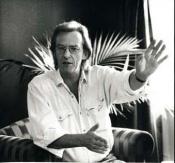Vi lämnade vårt läger innan solen brutit fram,
vi var elva meniga och en kapten i vårt förband.
Vi gick mot Nicaragua, gränsen nåddes klockan sju,
och redan klockan åtta kom vi fram till första byn.
Vår uppgift var att rekrytera bönder ifrån byn,
men det tycktes som dom flesta av dom redan hunnit fly.
Vi fann dock en som gömde sej i brunnen på ett torg,
När vi hitta' honom kapade vi tampen, mest på skoj.
Han kunde inte simma, det blev allvarligt en stund;
Hans hustru stod och ylade som om hon var en hund.
Vi drog honom ur vattnet och vi krävde några svar,
bland annat på varthän dom andra hade gett sej av.
Han skakade på hu'vet och slog ut med armarna,
han fälldes av kaptenen med en spark mot tarmarna;
Den stackar'n börja' gråta, och be för sina barn,
och han svor vid alla helgon att han hade inga svar.
Förhören ledde ingenvart, trots allehanda hot,
förhörsledar'n, kaptenen, miste snart sitt tålamod;
Han fräste ut en order, några meniga gick fram,
och snart låg hustrun bunden i torgets heta sand.
Dom våldtog henne omsorgsfullt, jag minns att dom var tre.
Hennes man blev så pass upprörd att han måste lugnas ner;
Tyvärr tog slaget illa, kanske var han lite spröd,
för när det hela väl var över så var bonden faktiskt död.
När kvinnan släpptes skrek hon att hon också måste dö.
Hon klöste sej i skrevet så att klänningen blev röd;
Jag kunde inte se det, jag måste titta bort,
men kaptenen tog sitt ansvar och han gjorde pinan kort.
Jag har svårt i efterhand att själv begripa det som skett;
Man kan hänvisa till varje krigs förråande effekt.
Det kan va' en delförklaring att jag ej är sandinist,
men jag tycker inte själv det gör historien mindre trist.
Vi mördade två fattiga, det är en evig skam;
Men jag hoppas att jag tillåts kompensera det jag kan.
Så med juryns goda minne vill jag träffa deras barn,
och jag skall göra allt jag mäktar för att hedra mor och far.
Jag står i alla händelser till ert förfogande;
Jag har inställt mej här frivilligt, jag mördar aldrig mer.
Jag avsvär mej nu Contras, CIA och Pentagon,
och herrarna som köpte mej i det fjärran Washington.
...dom lämnade sitt läger innan solen brutit fram,
dom var tio meniga och en kapten i sitt förband.
Dom gick mot Nicaragua, gränsen nåddes klockan sju,
och redan klockan åtta kom dom fram till nästa by...
vi var elva meniga och en kapten i vårt förband.
Vi gick mot Nicaragua, gränsen nåddes klockan sju,
och redan klockan åtta kom vi fram till första byn.
Vår uppgift var att rekrytera bönder ifrån byn,
men det tycktes som dom flesta av dom redan hunnit fly.
Vi fann dock en som gömde sej i brunnen på ett torg,
När vi hitta' honom kapade vi tampen, mest på skoj.
Han kunde inte simma, det blev allvarligt en stund;
Hans hustru stod och ylade som om hon var en hund.
Vi drog honom ur vattnet och vi krävde några svar,
bland annat på varthän dom andra hade gett sej av.
Han skakade på hu'vet och slog ut med armarna,
han fälldes av kaptenen med en spark mot tarmarna;
Den stackar'n börja' gråta, och be för sina barn,
och han svor vid alla helgon att han hade inga svar.
Förhören ledde ingenvart, trots allehanda hot,
förhörsledar'n, kaptenen, miste snart sitt tålamod;
Han fräste ut en order, några meniga gick fram,
och snart låg hustrun bunden i torgets heta sand.
Dom våldtog henne omsorgsfullt, jag minns att dom var tre.
Hennes man blev så pass upprörd att han måste lugnas ner;
Tyvärr tog slaget illa, kanske var han lite spröd,
för när det hela väl var över så var bonden faktiskt död.
När kvinnan släpptes skrek hon att hon också måste dö.
Hon klöste sej i skrevet så att klänningen blev röd;
Jag kunde inte se det, jag måste titta bort,
men kaptenen tog sitt ansvar och han gjorde pinan kort.
Jag har svårt i efterhand att själv begripa det som skett;
Man kan hänvisa till varje krigs förråande effekt.
Det kan va' en delförklaring att jag ej är sandinist,
men jag tycker inte själv det gör historien mindre trist.
Vi mördade två fattiga, det är en evig skam;
Men jag hoppas att jag tillåts kompensera det jag kan.
Så med juryns goda minne vill jag träffa deras barn,
och jag skall göra allt jag mäktar för att hedra mor och far.
Jag står i alla händelser till ert förfogande;
Jag har inställt mej här frivilligt, jag mördar aldrig mer.
Jag avsvär mej nu Contras, CIA och Pentagon,
och herrarna som köpte mej i det fjärran Washington.
...dom lämnade sitt läger innan solen brutit fram,
dom var tio meniga och en kapten i sitt förband.
Dom gick mot Nicaragua, gränsen nåddes klockan sju,
och redan klockan åtta kom dom fram till nästa by...
inviata da Riccardo Venturi - 17/11/2005 - 17:59
Lingua: Italiano
Traduzione italiana di Riccardo Venturi
22 aprile 2018 09:12
22 aprile 2018 09:12
LA CONFESSIONE DEL SEÑOR MARTÍNEZ MONDRAGÓN
Lasciammo il nostro campo prima che spuntasse il sole,
eravamo undici soldati semplici e un capitano nella nostra unità.
Andavamo verso il Nicaragua, il confine fu raggiunto alle sette,
e già alle otto arrivammo al primo paese.
Il nostro compito era reclutare contadini del villaggio,
ma sembrava che i più di loro avevano fatto in tempo a scappare.
Ne trovammo però uno che si era nascosto nel pozzo in una piazza,
quando lo trovammo tagliammo la fune, perlopiù per scherzo.
Lui non sapeva nuotare, per un'ora fu una cosa seria;
sua moglie stava là a urlare come fosse una cagna.
Lo tirammo fuori dall'acqua e esigemmo alcune risposte,
tra le altre, dove se ne erano andati gli altri.
Lui scosse la testa e fece il gesto di aprire le braccia,
fu buttato a terra dal capitano con un calcio nella pancia;
quel poveraccio cominciò a piangere e a implorare per i suoi figli,
e giurò su tutti i santi di non avere nessuna risposta da dare.
L'interrogatorio non portò a nulla nonostante ogni sorta di minacce,
il capitano, che conduceva l'interrogatorio, perse presto la pazienza;
s'incazzò e diede un ordine, spuntarono dei soldati semplici
e presto la moglie si ritrovò a terra legata sulla sabbia calda della piazza.
La stuprarono scrupolosamente, mi ricordo che erano in tre,
suo marito ne fu talmente sconvolto, che dovette essere un po' calmato;
purtroppo la cosa andò male, forse lui era un po' fragile,
perché quando tutto fu finito, il contadino in effetti era morto.
Quando la donna fu slegata, urlò che anche lei doveva morire.
Si trafisse con il forcone finché il suo vestito non divenne rosso;
io non riuscivo a guardare, dovetti abbassare gli occhi,
ma il capitano si assunse la responsabilità e abbreviò la tortura.
E dopo faccio fatica io stesso a capire quel che è successo;
può avere a che fare con l'effetto brutalizzante di ogni guerra.
Una parziale spiegazione può essere che non sono sandinista,
ma io stesso non penso che renda la storia meno triste.
Abbiamo ammazzato due poveri, sarà una vergogna per sempre;
ma spero che mi sarà permesso di rimediare come posso.
Così, se la giuria darà parere favorevole, incontrerò i loro figli
e farò tutto quanto in mio potere per onorare i loro genitori.
Sono in ogni evenienza a vostra disposizione;
mi sono presentato qui volontariamente, io non ucciderò più.
Adesso rinnego i Contras, la CIA e il Pentagono
e i signori che mi hanno comprato nella lontana Washington.
...lasciarono il loro campo prima che spuntasse il sole,
erano undici soldati semplici e un capitano nella loro unità.
Andavano verso il Nicaragua, il confine fu raggiunto alle sette,
e già alle otto arrivarono al primo paese...
Lasciammo il nostro campo prima che spuntasse il sole,
eravamo undici soldati semplici e un capitano nella nostra unità.
Andavamo verso il Nicaragua, il confine fu raggiunto alle sette,
e già alle otto arrivammo al primo paese.
Il nostro compito era reclutare contadini del villaggio,
ma sembrava che i più di loro avevano fatto in tempo a scappare.
Ne trovammo però uno che si era nascosto nel pozzo in una piazza,
quando lo trovammo tagliammo la fune, perlopiù per scherzo.
Lui non sapeva nuotare, per un'ora fu una cosa seria;
sua moglie stava là a urlare come fosse una cagna.
Lo tirammo fuori dall'acqua e esigemmo alcune risposte,
tra le altre, dove se ne erano andati gli altri.
Lui scosse la testa e fece il gesto di aprire le braccia,
fu buttato a terra dal capitano con un calcio nella pancia;
quel poveraccio cominciò a piangere e a implorare per i suoi figli,
e giurò su tutti i santi di non avere nessuna risposta da dare.
L'interrogatorio non portò a nulla nonostante ogni sorta di minacce,
il capitano, che conduceva l'interrogatorio, perse presto la pazienza;
s'incazzò e diede un ordine, spuntarono dei soldati semplici
e presto la moglie si ritrovò a terra legata sulla sabbia calda della piazza.
La stuprarono scrupolosamente, mi ricordo che erano in tre,
suo marito ne fu talmente sconvolto, che dovette essere un po' calmato;
purtroppo la cosa andò male, forse lui era un po' fragile,
perché quando tutto fu finito, il contadino in effetti era morto.
Quando la donna fu slegata, urlò che anche lei doveva morire.
Si trafisse con il forcone finché il suo vestito non divenne rosso;
io non riuscivo a guardare, dovetti abbassare gli occhi,
ma il capitano si assunse la responsabilità e abbreviò la tortura.
E dopo faccio fatica io stesso a capire quel che è successo;
può avere a che fare con l'effetto brutalizzante di ogni guerra.
Una parziale spiegazione può essere che non sono sandinista,
ma io stesso non penso che renda la storia meno triste.
Abbiamo ammazzato due poveri, sarà una vergogna per sempre;
ma spero che mi sarà permesso di rimediare come posso.
Così, se la giuria darà parere favorevole, incontrerò i loro figli
e farò tutto quanto in mio potere per onorare i loro genitori.
Sono in ogni evenienza a vostra disposizione;
mi sono presentato qui volontariamente, io non ucciderò più.
Adesso rinnego i Contras, la CIA e il Pentagono
e i signori che mi hanno comprato nella lontana Washington.
...lasciarono il loro campo prima che spuntasse il sole,
erano undici soldati semplici e un capitano nella loro unità.
Andavano verso il Nicaragua, il confine fu raggiunto alle sette,
e già alle otto arrivarono al primo paese...
Lingua: Finlandese
Traduzione finlandese / Finnish translation / Traduction finnoise / Finsk översättning / Suomennos: Juha Rämö
SEÑOR MARTÍNEZ MONDRAGÓNIN TUNNUSTUS
Lähdimme leiristämme ennen auringonnousua.
Meitä oli yksitoista alokasta ja kapteeni.
Kuljimme kohti Nicaraguaa, tulimme rajalle seitsemältä,
ja saavuimme jo kahdeksalta ensimmäiseen kylään.
Tehtävänämme oli värvätä kylän talonpoikia armeijaan,
mutta näytti siltä, että useimmat olivat jo ehtineet paeta.
Yksi kuitenkin löytyi piiloutuneena torilla olevaan kaivoon.
Löydettyämme hänet katkaisimme köyden lähinnä huviksemme.
Mies ei osannut uida, ja hetken aikaa tilanne oli vakava.
Hänen vaimonsa seisoi siinä ja ulvoi kuin koira.
Nostimme miehen vedestä ja aloimme tehdä kysymyksiä
muun muassa siitä, minne muut olivat menneet.
Mies pudisteli päätään ja levitteli käsiään,
kunnes kapteeni potkaisi häntä vatsaan ja hän kaatui maahan.
Miesparka alkoi itkeä ja rukoilla lastensa puolesta
ja vannoi kaikkien pyhimysten kautta, ettei tiennyt mitään.
Kuulustelu ei johtanut mihinkään kaikesta uhkailusta huolimatta.
Sitä johtanut kapteeni menetti pian malttinsa.
Hän karjaisi määräyksensä, muutama alokas astui esiin,
ja pian vaimo makasi sidottuna torin kuumassa hiekassa.
Nainen raiskattiin huolella, tekijöitä oli muistaakseni kolme.
Mies meni tästä niin sekaisin, että hänet oli taltutettava.
Valitettavasti isku epäonnistui tai ehkä mies oli vain jotenkin hauras,
sillä kun kaikki oli lopulta ohi, hän oli todellakin kuollut.
Kun nainen päästettiin irti, hän kirkui, että hänenkin on kuoltava.
Hän alkoi repiä alapäätään niin että hame värjäytyi punaiseksi verestä.
En voinut katsoa, vaan minun oli pakko kääntää pääni,
mutta kapteeni tunsi vastuunsa ja päätti naisen piinan lyhyeen.
Jälkeenpäin minun on vaikea ymmärtää, mitä tapahtui.
Aina voi vedota siihen, että sota tekee ihmisestä raakalaisen.
Osansa asiassa saattaa olla sillä, että en ole sandinisti,
mutta se ei mielestäni vähennä tapahtuneen traagisuutta.
Me murhasimme kaksi köyhää ihmistä, ja se on ikuinen häpeä.
Mutta toivottavasti saan hyvittää sen, minkä voin,
tavata syyllisyyttäni punnitsevien suosiollisella luvalla uhrien lapsia
ja tehdä kaikkeni osoittakseeni heidän äidilleen ja isälleen kunnioitustani.
Olen kaikessa teidän käytettävissänne.
Olen tullut tänne vapaaehtoisesti, en koskaan enää murhaa,
sanoudun irti contrista, CIA:sta ja Pentagonista
ja kaukaisen Washingtonin herroista, jotka ostivat minut.
...he lähtivät leiristään ennen auringonnousua.
Heitä oli yksitoista alokasta ja kapteeni.
He kulkivat kohti Nicaraguaa, tulivat rajalle seitsemältä,
ja saapuivat jo kahdeksalta ensimmäiseen kylään.
Lähdimme leiristämme ennen auringonnousua.
Meitä oli yksitoista alokasta ja kapteeni.
Kuljimme kohti Nicaraguaa, tulimme rajalle seitsemältä,
ja saavuimme jo kahdeksalta ensimmäiseen kylään.
Tehtävänämme oli värvätä kylän talonpoikia armeijaan,
mutta näytti siltä, että useimmat olivat jo ehtineet paeta.
Yksi kuitenkin löytyi piiloutuneena torilla olevaan kaivoon.
Löydettyämme hänet katkaisimme köyden lähinnä huviksemme.
Mies ei osannut uida, ja hetken aikaa tilanne oli vakava.
Hänen vaimonsa seisoi siinä ja ulvoi kuin koira.
Nostimme miehen vedestä ja aloimme tehdä kysymyksiä
muun muassa siitä, minne muut olivat menneet.
Mies pudisteli päätään ja levitteli käsiään,
kunnes kapteeni potkaisi häntä vatsaan ja hän kaatui maahan.
Miesparka alkoi itkeä ja rukoilla lastensa puolesta
ja vannoi kaikkien pyhimysten kautta, ettei tiennyt mitään.
Kuulustelu ei johtanut mihinkään kaikesta uhkailusta huolimatta.
Sitä johtanut kapteeni menetti pian malttinsa.
Hän karjaisi määräyksensä, muutama alokas astui esiin,
ja pian vaimo makasi sidottuna torin kuumassa hiekassa.
Nainen raiskattiin huolella, tekijöitä oli muistaakseni kolme.
Mies meni tästä niin sekaisin, että hänet oli taltutettava.
Valitettavasti isku epäonnistui tai ehkä mies oli vain jotenkin hauras,
sillä kun kaikki oli lopulta ohi, hän oli todellakin kuollut.
Kun nainen päästettiin irti, hän kirkui, että hänenkin on kuoltava.
Hän alkoi repiä alapäätään niin että hame värjäytyi punaiseksi verestä.
En voinut katsoa, vaan minun oli pakko kääntää pääni,
mutta kapteeni tunsi vastuunsa ja päätti naisen piinan lyhyeen.
Jälkeenpäin minun on vaikea ymmärtää, mitä tapahtui.
Aina voi vedota siihen, että sota tekee ihmisestä raakalaisen.
Osansa asiassa saattaa olla sillä, että en ole sandinisti,
mutta se ei mielestäni vähennä tapahtuneen traagisuutta.
Me murhasimme kaksi köyhää ihmistä, ja se on ikuinen häpeä.
Mutta toivottavasti saan hyvittää sen, minkä voin,
tavata syyllisyyttäni punnitsevien suosiollisella luvalla uhrien lapsia
ja tehdä kaikkeni osoittakseeni heidän äidilleen ja isälleen kunnioitustani.
Olen kaikessa teidän käytettävissänne.
Olen tullut tänne vapaaehtoisesti, en koskaan enää murhaa,
sanoudun irti contrista, CIA:sta ja Pentagonista
ja kaukaisen Washingtonin herroista, jotka ostivat minut.
...he lähtivät leiristään ennen auringonnousua.
Heitä oli yksitoista alokasta ja kapteeni.
He kulkivat kohti Nicaraguaa, tulivat rajalle seitsemältä,
ja saapuivat jo kahdeksalta ensimmäiseen kylään.
inviata da Juha Rämö - 19/11/2018 - 15:25
Lingua: Inglese
English translation by Ceil Herman
Lyrics by Björn Afzelius and music by Jim Page.
Björn Afzelius wrote the following notes in his 95 Sånger (95 Songs) book:
"Jag satt en dag på stranden i Italien och läste Herald Tribune. På sidan sju redovisades ett förhörsprotokoll från Nicaragua. En Contrasoldat hade fått nog av sin egen verksamhet och frivilligt överlämnat sig till Sandanistregererigen i Managua. När jag läst artiklen frös jag som en hund i solskenet. Jag lämnade stranden och gick hem och skrev texten direkt ur tidningen. Offret i sången Ar bara två av de femtiotusen dodade nicaraguanska bönder, vilkas liv Ronald Reagan har på sin samvete - om han nu haft en sådant."
"One day I sat on the beach in Italy and read the Herald Tribune. On page seven was reported an interrogation minutes from Nicaragua. A Contra soldier had had enough of his own activities and freely surrendered himself to the Sandinista regime in Managua. When I read the article, I froze like a dog in the sunlight. I left the beach and went home and wrote the lyrics direct out of the newspaper. The victims in the song are only 2 of 50,000 dead Nicaraguan farmers, whose lives Ronald Reagan has on his conscience if he had such a thing now."
Björns Afzelius' comments from the slbum ”Björn Afzelius & Mikael Wiehe”,1986:
The original song by Jim Page is titled "Bobby Cortez" and those lyrics recall his friend from his high school who dropped out of school and was killed in Viet Nam. The tombstone at the school has the names on it of those who fell in the war. Bobby Cortez is number 4 on the list.
Lyrics by Björn Afzelius and music by Jim Page.
Björn Afzelius wrote the following notes in his 95 Sånger (95 Songs) book:
"Jag satt en dag på stranden i Italien och läste Herald Tribune. På sidan sju redovisades ett förhörsprotokoll från Nicaragua. En Contrasoldat hade fått nog av sin egen verksamhet och frivilligt överlämnat sig till Sandanistregererigen i Managua. När jag läst artiklen frös jag som en hund i solskenet. Jag lämnade stranden och gick hem och skrev texten direkt ur tidningen. Offret i sången Ar bara två av de femtiotusen dodade nicaraguanska bönder, vilkas liv Ronald Reagan har på sin samvete - om han nu haft en sådant."
"One day I sat on the beach in Italy and read the Herald Tribune. On page seven was reported an interrogation minutes from Nicaragua. A Contra soldier had had enough of his own activities and freely surrendered himself to the Sandinista regime in Managua. When I read the article, I froze like a dog in the sunlight. I left the beach and went home and wrote the lyrics direct out of the newspaper. The victims in the song are only 2 of 50,000 dead Nicaraguan farmers, whose lives Ronald Reagan has on his conscience if he had such a thing now."
Björns Afzelius' comments from the slbum ”Björn Afzelius & Mikael Wiehe”,1986:
"Martinez Mondragon var personlig livvakt för Nicaraguas tidigare diktator Somoza. Efter sandinisternas seger blev Mondragon contras-soldat. Efter några års strider blev han den förste officer som använde sig av sandinisternas amnesti. Vid en presskonferens i Managua redogjorde han för sina skäl att hoppa av Contras. Denna sång är en del av hans berättelse."
"Martinez Mondragon was the personal bodyguard for Nicaragua's earlier dictator, Somoza. After the Sandanists conquered, Mondragon because the Contra's soldier. After several years of conflict he became the first officer who used Sandinist's amnesty. At a press conference in Manague, he reported about his reasons to leave the Contras. This song is a part of his confession."
"Martinez Mondragon was the personal bodyguard for Nicaragua's earlier dictator, Somoza. After the Sandanists conquered, Mondragon because the Contra's soldier. After several years of conflict he became the first officer who used Sandinist's amnesty. At a press conference in Manague, he reported about his reasons to leave the Contras. This song is a part of his confession."
The original song by Jim Page is titled "Bobby Cortez" and those lyrics recall his friend from his high school who dropped out of school and was killed in Viet Nam. The tombstone at the school has the names on it of those who fell in the war. Bobby Cortez is number 4 on the list.
We left our camp
before the sun broke out,
we were eleven privates
and a captain in our unit.
We went towards Nicaragua,
and reached the border at 7:00,
and already by 8:00
we came to the first village.
Our assignment was to recruit
farmers from the village,
but it seemed that most
of them had already found time to flee.
We found only one who hid
in the well in a town square
When we found him we cut
the end of the rope, mostly as a joke.
He could not swim,
lt became serious in time;
His wife stood and yowled
like she was a dog.
We dragged him out of the water
and we demanded some answer,
among other things of
where the others had gone.
He shook his head
and hit out with his arms.
he was knocked down by the captain
with a kick in the intestines;
The poor one began to cry
and beg for his children
and he swore by everything holy
that he had no answer.
The interrogation led nowhere,
in spite of threats of all sorts.
The interrogation leader captain,
soon lost his patience;
he hissed out an order,
a few soldiers came forth.
and soon the wife lay tied up
in the square's hot sand.
They raped his wife carefully,
I remember there were three.
Her husband became so upset
that he must be quieted down;
Unfortunately he took the beating badly,
perhaps he was a little delicate.
because when the whole thing was over,
the farmer was in fact dead.
When the woman was released she screamed
that she must also die.
She clawed herself in the crotch
so her dress became red;
I couldn't watch it,
I must look away
but the captain took his responsibility,
and he made the suffering short.
I had a hard time gradually to
understand what happened myself;
One can refer to every war's
brutalizing effects,
It can be a partial explanation
that I am not a Sandinist,
but I don't think myself that it makes
the story less sad.
We murdered two poor ones,
that is an eternal shame;
But I hope that I can be allowed
to compensate what I can.
So with the jury's good memory
I want to meet their children,
and I will do everything I can express
to honor their mother and father,
I stand in all the events
to your disposal;
I have suspended myself voluntarily,
I don't murder any more.
I now renounce the Contras,
the CIA, and the Pentagon,
and the men who bought me
in the far away Washington."
...they left their camp
before the Sun broke through,
they were 10 privates
and a captain in his unit.
They walked towards Nicaragua,
the border was reached at 7:00.
and already by 8:00
they came to the next village...
before the sun broke out,
we were eleven privates
and a captain in our unit.
We went towards Nicaragua,
and reached the border at 7:00,
and already by 8:00
we came to the first village.
Our assignment was to recruit
farmers from the village,
but it seemed that most
of them had already found time to flee.
We found only one who hid
in the well in a town square
When we found him we cut
the end of the rope, mostly as a joke.
He could not swim,
lt became serious in time;
His wife stood and yowled
like she was a dog.
We dragged him out of the water
and we demanded some answer,
among other things of
where the others had gone.
He shook his head
and hit out with his arms.
he was knocked down by the captain
with a kick in the intestines;
The poor one began to cry
and beg for his children
and he swore by everything holy
that he had no answer.
The interrogation led nowhere,
in spite of threats of all sorts.
The interrogation leader captain,
soon lost his patience;
he hissed out an order,
a few soldiers came forth.
and soon the wife lay tied up
in the square's hot sand.
They raped his wife carefully,
I remember there were three.
Her husband became so upset
that he must be quieted down;
Unfortunately he took the beating badly,
perhaps he was a little delicate.
because when the whole thing was over,
the farmer was in fact dead.
When the woman was released she screamed
that she must also die.
She clawed herself in the crotch
so her dress became red;
I couldn't watch it,
I must look away
but the captain took his responsibility,
and he made the suffering short.
I had a hard time gradually to
understand what happened myself;
One can refer to every war's
brutalizing effects,
It can be a partial explanation
that I am not a Sandinist,
but I don't think myself that it makes
the story less sad.
We murdered two poor ones,
that is an eternal shame;
But I hope that I can be allowed
to compensate what I can.
So with the jury's good memory
I want to meet their children,
and I will do everything I can express
to honor their mother and father,
I stand in all the events
to your disposal;
I have suspended myself voluntarily,
I don't murder any more.
I now renounce the Contras,
the CIA, and the Pentagon,
and the men who bought me
in the far away Washington."
...they left their camp
before the Sun broke through,
they were 10 privates
and a captain in his unit.
They walked towards Nicaragua,
the border was reached at 7:00.
and already by 8:00
they came to the next village...
inviata da Ceil Herman - 12/1/2019 - 21:57
×
![]()








Dall'album "Björn Afzelius & Mikael Wiehe"
Testo ripreso da:
http://www.vanster.nu/
(Il sito della sinistra radicale svedese)
Lyrics by Björn Afzelius
Music by Jim Page (Bobby Cortez)
From "Björn Afzelius & Mikael Wiehe" [1986]
Lyrics available at:
http://www.vanster.nu
(Swedish radical Left website)
Questa canzone, che due tra i maggiori cantautori svedesi di ogni tempo, Mikael Wiehe e Björn Afzelius, scrissero insieme, parla di una delle tante importazioni della democrazia effettuate dagli Stati Uniti d'America. Fino al 1979 il Nicaragua faceva parte del "giardino di casa" degli USA, come tutta l'America Latina (ad eccezione di Cuba); lo stato centroamericano era retto dalla dittatura familiare dei Somoza Debayle, e non sto nemmeno a dire di chi costoro fossero agli ordini. Una volta trionfata la rivoluzione sandinista, e con la nuova amministrazione USA guidata da Ronald Reagan, scoppiò la controguerriglia dei "Contras", finanziata abbondantemente dal Pentagono e dalla CIA, con basi perlopiù nei confinanti e fedeli Guatemala, Salvador e Honduras (i cui eserciti prestavano a loro volta aiuto logistico e militare) ; uno dei tanti esempi di "esportazione della democrazia" da parte degli USA. La storia raccontata in questa canzone di Mikael Wiehe e Björn Afzelius è reale, e mostra perfettamente in che cosa consistesse la "controguerriglia" dei Contras; lo riprendiamo da questo esauriente articolo del Washington Post. Il sottufficiale "Contra" José Efrén Martínez Mondragón aveva preso parte a diverse scorrerie in villaggi nicaraguensi, dove aveva assistito ad episodi di brutalità, prelevamento forzato di contadini e stupri. Ad un certo punto non riuscì più a sopportarlo, e disertò chiedendo rifugio nell'ambasciata messicana, e confessando tutto quanto e mostrandosi sinceramente pentito degli orrori di cui era stato testimone e protagonista. Possibile che anche l'episodio di Mondragón abbia contribuito alla decisione del congresso USA, nel 1985, di bloccare totalmente il finanziamento ai "Contras". [RV]
A Defecting Nicaraguan Contra's Tale
The Washington Post, May 8, 1985
Ever since 1980, when he was among the first Nicaraguans to join the anti-Sandinista resistance, Jose Efren Martinez Mondragon had appeared to follow the typical career of the dedicated contra, or counterrevolutionary, guerrilla leader.
Formerly a sergeant in the National Guard of deposed dictator Anastasio Somoza, Martinez Mondragon worked his way up in the resistance movement from commander of a guerrilla training unit in Honduras to become a task force commander who regularly led missions inside Nicaragua. Just six months ago, he was commanding 180 contras on a patrol in Esteli province, deep inside territory normally controlled by the Sandinistas.
Today, however, Martinez Mondragon did something that no contra commander ever had done before: he flew home to Managua to be welcomed by his former foes as a defector. He will take advantage of a Nicaraguan amnesty law approved earlier this year that provides for a pardon for rebels who lay down their arms. Eight weeks ago, Martinez Mondragon and nine other persons, including two other guerrillas, sought political asylum in the Mexican Embassy in Tegucigalpa, Honduras. Initially the Honduran government refused to let him leave the country, although the others were permitted to depart for Nicaragua almost immediately, and his fate was uncertain until a week ago when the Honduran authorities finally let him fly to Mexico City.
The defection ended what Martinez Mondragon described as a prolonged personal ordeal of several years as he grappled with his own doubts about the guerrillas' cause and, even more, about their behavior in the field. In a four-hour interview here last night, he said he left the contras in disgust with what he said were their routine practices of murder, kidnaping and rape of Nicaraguan civilians.
"They are kidnaping and killing people who just want to work," the 26-year-old defector said. "This wasn't a struggle. It was banditry."
While there have been news reports of individual incidents of alleged killings and abductions by the contras of Nicaraguan civilians who were, or were believed to be, Sandinista sympathizers, Reagan administration officials in the past have denied the validity of claims that such practices were routine and characterized the claims as propaganda.
In another assertion that was likely to be controversial, Martinez Mondragon said that the Honduran, Salvadoran and Guatemalan armies have supplied the contras with the bulk of their ammunition and other military supplies since the CIA stopped funding them a year ago.
Spokesmen in Miami and Honduras for the rebel group Martinez Mondragon belonged to were unavailable today for comment on his specific allegations.
Because of the severity of his charges and the unprecedented nature of his defection, Martinez Mondragon's change of heart could contribute to the political debate that extends from Managua to the U.S. Congress. The guerrillas previously have drawn criticism for human rights abuses from some unofficial U.S. monitoring groups. This has become a factor in the U.S. debate over whether Washington should resume financial backing for them.
Several former Sandinista leaders, such as Arturo Cruz and Eden Pastora, and many sympathizers of the Sandinistas have broken with Managua's government and are allied with the rebels. Martinez Mondragon, a middle-level contra field commander, is the first to go the other way.
The defection already has triggered a flurry of activity by several of the players involved, either to control the damage or maximize it.
The Nicaraguan Democratic Force, the largest of the rebel groups and the one to which Martinez Mondragon belonged, already has suggested that the defector had lost some of his mental faculties because of a motor vehicle accident. The force, known by its Spanish initials FDN, also has charged that Martinez Mondragon's lover was a Sandinista spy who may have encouraged the defection.
For its part, the Nicaraguan government wasted no time making the defector available to the media, presenting him both at the interview last night and at a news conference upon his arrival in Managua this morning.
In the interview, Martinez Mondragon alleged that the contras have regularly killed Nicaraguans who refused to join the rebel cause after crossing the border into Honduras or after being abducted and brought there by the guerrillas. He said that there were several clandestine cemeteries for such victims along the Nicaraguan-Honduran border, including one near a hamlet called San Judas in Honduras' Choluteca province, and another at La Lodoza in El Paraiso province.
"If you won't fight, then they think you are a Sandinista infiltrator and kill you," he said.
He said the armed forces of Honduras, El Salvador and Guatemala currently are providing the FDN with the bulk of its ammunition, uniforms and boots. He said he had seen Honduran military trucks and helicopters deliver ammunition and other supplies to contra camps, and that he had learned from friends who handled the rebels' supplies that these three countries' armies were the principal source of materiel.
The FDN's base camps are inside Honduras just across the border from Nicaragua, and the defector said that Honduran Army officers control all deliveries of military supplies to the contras.
Since Congress stopped the CIA from funding the guerrillas a year ago, the source of the rebels' military supplies has been something of a mystery. The rebels say they have continued their fight with the aid of private donations, but several reports have surfaced that the Honduran, Salvadoran and Guatemalan governments were playing an important role.
Martinez Mondragon said that other contra commanders had told him that "the CIA advisers arranged for the Salvadoran, Guatemalan and Honduran armies to provide materiel" to the FDN. He did not say when the CIA supposedly had done this, however.
He said guerrillas frequently had raped civilian women in Nicaragua and abducted them for sexual use.
During a patrol in Nicaragua's Jinotega province last August, the defector said, he came across a group of 40 families near Wina who said that they had been abducted by another patrol from the San Jacinto regional command. This patrol had abducted and raped eight young women from the group, and had killed eight young men who refused to join the rebels, he said.
At that time, Martinez Mondragon said, he radioed FDN military leader Enrique Bermudez to complain about the treatment of the civilians. Bermudez told him "to stop interfering in business that doesn't affect you," the defector said. This was only one of several times that Martinez Mondragon complained to FDN leaders about abuses by the rebels and received unsatisfactory responses, he said.
The interview was conducted in a sitting room at the Nicaraguan ambassador's residence in Mexico City, but the defector said that he had not been pressured to grant the interview and had not been briefed beforehand by Sandinista officials. Nicaraguan Embassy officers wandered through the room from time to time during the talk, but their presence did not seem to affect Martinez Mondragon.
The defector acknowledged that he was seriously hurt in the vehicle accident, when he struck his head hard and was unconscious for a week. He spoke slowly, occasionally lost his train of thought and said that his head still hurt "deep inside" from time to time.
While the FDN has suggested that he cannot be trusted because of brain damage, the FDN did entrust him to command several missions inside Nicaragua after the accident had taken place.
Martinez Mondragon expressed fears that the FDN would take reprisals against his friends or family. He said he believed the FDN's leadership was responsible for the deaths of his brother and two of his cousins.